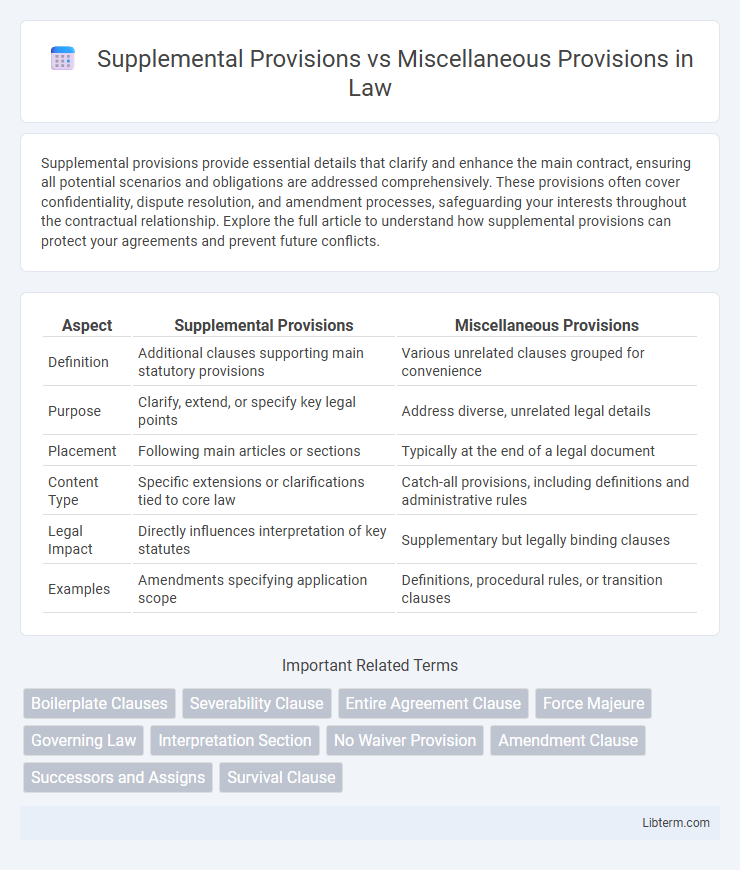Supplemental provisions provide essential details that clarify and enhance the main contract, ensuring all potential scenarios and obligations are addressed comprehensively. These provisions often cover confidentiality, dispute resolution, and amendment processes, safeguarding your interests throughout the contractual relationship. Explore the full article to understand how supplemental provisions can protect your agreements and prevent future conflicts.
Table of Comparison
| Aspect | Supplemental Provisions | Miscellaneous Provisions |
|---|---|---|
| Definition | Additional clauses supporting main statutory provisions | Various unrelated clauses grouped for convenience |
| Purpose | Clarify, extend, or specify key legal points | Address diverse, unrelated legal details |
| Placement | Following main articles or sections | Typically at the end of a legal document |
| Content Type | Specific extensions or clarifications tied to core law | Catch-all provisions, including definitions and administrative rules |
| Legal Impact | Directly influences interpretation of key statutes | Supplementary but legally binding clauses |
| Examples | Amendments specifying application scope | Definitions, procedural rules, or transition clauses |
Introduction to Supplemental and Miscellaneous Provisions
Supplemental provisions address specific additional terms that clarify or modify the primary contract, ensuring precise obligations and rights beyond the main clauses. Miscellaneous provisions encompass a diverse range of general contractual elements such as governing law, dispute resolution, and amendment procedures that do not fit neatly into other sections. Both sections enhance contract comprehensiveness and enforceability by covering essential but varied aspects of agreement administration.
Definitions: Supplemental vs Miscellaneous Provisions
Supplemental Provisions are specific contract clauses that provide additional, detailed terms directly related to the main agreement, ensuring clarity and addressing potential contingencies. Miscellaneous Provisions encompass a broad range of general clauses that govern various standard aspects of the contract, such as severability, waiver, and notices, often serving as catch-all categories. The key difference lies in Supplemental Provisions delivering targeted, substantive content, while Miscellaneous Provisions cover overarching administrative or procedural elements.
Purpose and Importance of Supplemental Provisions
Supplemental Provisions serve to clarify, extend, or modify the main contract terms, ensuring completeness and addressing unforeseen issues that may arise during contract execution. Their purpose is to provide additional details or conditions that protect parties' interests and enhance contractual clarity, preventing disputes and ambiguities. This importance lies in promoting contract stability and adaptability without overhauling the primary agreement, distinguishing them from Miscellaneous Provisions which typically cover administrative or procedural aspects.
Role and Scope of Miscellaneous Provisions
Miscellaneous provisions in legal documents serve as catch-all clauses that address various regulatory, procedural, or interpretive issues not covered in the main sections, ensuring comprehensive governance and clarity. These provisions often clarify enforceability, jurisdiction, amendment processes, and other standard operational details, providing a safety net for unanticipated scenarios. In contrast, supplemental provisions specifically expand or modify primary terms, adding necessary details without altering the core framework.
Key Differences Between Supplemental and Miscellaneous Provisions
Supplemental Provisions provide specific additional terms that clarify, expand, or amend key contract clauses, enhancing the agreement's scope and precision. Miscellaneous Provisions serve as catch-all sections covering various standard or administrative details that do not fit elsewhere but ensure legal completeness and operational consistency. The key difference lies in Supplemental Provisions directly modifying or supplementing main contract terms, while Miscellaneous Provisions address general housekeeping or procedural matters.
Legal Interpretation and Application
Supplemental provisions clarify specific terms, conditions, or exceptions that directly impact the enforceability and scope of a contract, aiding precise legal interpretation and reducing ambiguity. Miscellaneous provisions typically address procedural or administrative details that support the contract's overall implementation but do not alter substantive rights or obligations. Courts often give greater weight to supplemental provisions when resolving disputes, as they reflect parties' nuanced intentions and specific legal contexts.
Examples of Supplemental Provisions in Legislation
Supplemental provisions in legislation typically include detailed clauses such as definitions, effective dates, severability, and application scopes that support the main statutory framework. Examples often encompass emergency clauses, sunset provisions, and administrative guidelines that clarify or enhance the implementation of primary legislative mandates. Miscellaneous provisions, by contrast, usually cover a broader range of unrelated or residual items not addressed elsewhere, ensuring comprehensive legal coverage without altering core statutory obligations.
Common Miscellaneous Provisions in Law
Common miscellaneous provisions in law often include clauses on severability, governing law, dispute resolution, and amendment procedures, ensuring clarity and enforceability in contracts and statutes. Supplemental provisions typically address additional, specific requirements or frameworks that support the main legal text but are not part of the core clauses. Understanding these distinctions helps in drafting comprehensive and legally sound agreements.
Implications for Legal Drafting and Compliance
Supplemental provisions clarify, expand, or modify specific terms within a contract, ensuring precise scope and applicability, while miscellaneous provisions address general administrative, procedural, or housekeeping matters. In legal drafting, distinguishing these sections improves contract organization, reduces ambiguity, and facilitates compliance by clearly allocating responsibilities and reducing interpretive conflicts. Effective use of both provisions enhances enforceability and regulatory adherence by providing comprehensive yet structured contractual guidance.
Conclusion: Choosing the Right Provisions
Selecting between Supplemental Provisions and Miscellaneous Provisions depends on the specific needs of a contract, as Supplemental Provisions provide detailed, tailored terms that address particular aspects of an agreement. Miscellaneous Provisions serve as catch-all clauses covering general legal safeguards that do not fit elsewhere but remain essential for comprehensive contract protection. Opting for the right provisions ensures clarity, legal enforceability, and minimizes potential disputes in contract execution.
Supplemental Provisions Infographic

 libterm.com
libterm.com